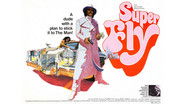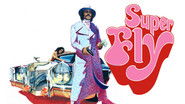Mr-Fusion
The big draw to "Super Fly" is Curtis Mayfield's case study in funk. A score like that, the sort that defines and threatens to hijack a movie, it doesn't come along everyday.. Which isn't saying the rest of the movie is bad. It's a one last drug score" story, played right down the middle. And it's not fair to the movie to say this has been done to death, but this was clearly more potent in its subject matter back in '72. It's worth seeing today, mostly for the gritty locations, brooding Ron O'Neal, and the bleak results of dead-end ghetto life.Really, it's that sweet music I can't get out of my head.6/10
utgard14
Ron O'Neal plays a drug dealer name Youngblood Priest who wants out of the business. But not before one last big score. As you might expect, it won't be as easy to get out as he hopes. You've probably seen variations on this story dozens of times before and after Super Fly, but rarely this good. This is one of the high points of the Blaxploitation genre. Yes, it's morally suspect and not for all tastes. But it's also an exciting, gritty, and colorful urban drama. There's a great sex scene and a funny slow motion fight scene that are two of the highlights. Good direction from Gordon Parks, Jr. and an amazing score by Curtis Mayfield. Filmed on location in early '70s New York which gives it a great atmosphere and realism.
main-38
Rather than sugar coating subject matter and attempting to be politically correct, exploitation films blatantly depicted drug use and violence forcing movie goers into situations they may or may not be comfortable with viewing. Blaxploitation does this just as any other films encompassed in the genre and, unfortunately, has gotten excess criticism from both film critics, advocacy groups and even Civil Rights leaders. Films like Dolemite, Blacula and especially Superfly have been said to further stereotypes, promote violence and generally cast Black culture in a negative light. However, what many fail to see is that movies like Superfly are truly liberating to the culture the film is targeted for and further more, a commentary on social lives of Blacks at the time. Much like H. Rap Brown's, Die N!@@^# Die, Superfly is a commentary of two kinds of African American thought during the late 60s and into the late 70s.Of the many positions taken in the book, H. Rap Brown argues that there were different kinds of African American mentalities during the Black Power movement. There were those who were ready and willing to fight for change and move away from a society dominated by white ideals and racism. Although, there were also those who were complacent with their lives and unwilling to take any stance against the race who continued to force them into second class lifestyles. These mentalities are clearly stated in Superfly and it is an issue that the protagonist, Priest, struggles with throughout the film. Priest is a streetwise cocaine dealer in the midst of making a life changing decision. Rather than continuing his life dealing drugs, fighting rivals and avoiding the corrupt police he decides to make one final deal and leave the life. The Priest character's archetype is very similar to the second of the two groups mentioned in Brown's book. Often times, African Americans tired of the white controlled system turned to drugs and crime. Rather than trying to better society, they often times made it worse, killing and corrupting others. The Priest, fed up with the white dominated society, had acquired a small wealth selling drugs. Although, after some time of dealing he realizes he is putting both his own life and the lives of other in danger.It is at this point that Priest becomes some what of a black power symbol, slowly removing himself from his previous lifestyle, liberating himself from his white girlfriend; who is clearly using him for his connections in the drug world, and attempting to cast negative light on the corrupt, drug dealing police officers in power. Priest's partner, Eddie, is his stark opposite in the film. Where Priest attempts to leave his old life, Eddie wants to delve deeper into the world after Priest and Eddie are forced into doing deals for the police. Eddie sees this as an opportunity for more wealth, where Priest knows it is truly a form of modern slavery; where the police are the masters and individuals like Priest and Eddie are the slaves and Priest is not willing to tolerate this abuse.Curtis Mayfield composed and performed all of the songs featured in the film. The films main song, "Superfly", sums up the issues faced by drug dealers on a day to day basis. The lyrics, "Hard to understand ,what a hell of a man, this cat of the slum, had a mind, wasn't dumb, but a weakness was shown, 'cause his hustle was wrong, his mind was his own, but the man lived alone" illustrate Priest's lifestyle as a hustler with a strong mind. He finally recognizes the wrong doings he has committed and must pull himself up from the streets. Similarly, the song "Pusherman" tackles other inner struggles faced by Priest. Lyrics such as, "been told I can't be nothing' else, just a hustler in spite of myself, I know I can rake it, this life just don't make it" show white America's perceptions of Black Americans who have given up on society. Powerful whites, at the time, felt that there was no retribution for those who committed their lives to crime and drugs. Furthermore, a statement is made that inner city African Americans are never given the chances of whites outside the cities; also a trend in Brown's book. Black youths were often times told that there is nothing for them outside of inner city life. The expectations of those around Priest are to deal drugs, make money and risk their lives. Anyone who tries to leave the life will face scrutiny and they are actually expected to fail.Overall, Superfly black America's response to white America's perceptions about inner city life. Superfly and the Priest are black America's version of John Wayne, Clint Eastwood and Charles Bronson. The film defines ideas proposed by black power figures and does all of this while still incorporating an entertaining and engaging story. The film is also a commentary of the relationships between different groups of African American groups in violent times. It is a story about retribution and exceeding the expectations of both those in power and those around an individual. Using strong black power themes, a once corrupted drug dealer becomes a symbol of black strength and perseverance at a time when racism was at its worst
chaos-rampant
Ron Earl is the Priest, independent Harlem coke dealer who is out for the big deal, one last push before he's out of there and out of the street. He also happens to be the protagonist and the one character we're called to empathize with and if that pose a problem for some, it's a directorial choice I applaud even only for its disregard of PC norm. In a genre populated for the most part by cops, private dicks and other manifestations of the law, having a drug dealer kicking ass and not in the name of some higher value, without him renouncing his past or seeing the error of his ways and becoming goodie two-shoes in a last minute, flimsy attempt to redeem the movie in the eyes of moral censors, without being heavy-handed or trashy is certainly admirable. Those that enjoy taking the moral high ground against the movie they're watching will find plenty of ground here to do so. I don't. I might oppose a movie on a political level but only when it tries to make a political statement out of it and Superfly sure as hell doesn't, at least not beyond what genre conventions might dictate (i.e. whitey is bad). The Priest however renounces the hypocrisy of "Black Nation" scumballs going around asking him for money just as much as he rails against the "redneck faggot" captain who doubletimes as the local drug lord.So if Super Fly is so good, it's because The Priest's desire comes across so transparent, strong and clear. Get off the street. A home, a vine, his woman, that's all he wants out of life now, despite (or perhaps because of) him being a societal leech feeding off people's addiction. Dealing drugs is just a job for him, a means to an end. His partner Eddie rambles on at one point early in the movie about how "it's all whitey left them to do" on which I call shenanigans; that way of thinking is never further expounded upon in relation to the Priest's goal and Eddie in the end proves himself to be a backstabbing, greedy son of a bitch. I think the best way to sketch out The Priest's character is by using Lee Marvin's words when he was asked what it felt like to have played so many bad guys in his life: "My characters weren't bad. They were just trying to get through the day". That's pretty much the wavelength Super Fly channels its protagonist through. Neither condemnation, nor approval, it's just the way it is.Super Fly is so damn good however, not just because its drug dealer protagonist comes across as genuine and sympathetic, but more so because it never allows itself to be drawn to the sillier end of blaxploitation. No 'mack daddy' sleazy pimpin' fabulousness here, the movie is constantly rooted in reality, taking itself serious before asking the viewer to do the same, but also groovy and funky as only blaxploitation flicks can be. A big part of that distinct seventies charm is due to Curtis Mayfield's stupendous score, playing over most of the film, but also the seedy back-alleys and rundown neighborhoods of then contemporary Harlem, the grime almost reaching across the screen.Grade A blaxpoitation then, but also a smokin' hot crime flick with characterization that is better than most, good pace, all-around good acting, booty-shaking' music, afros and a few punches thrown in for good measure, Super Fly is among the best of its kind. Strongly recommended.






